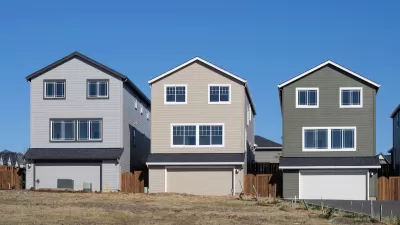Homeownership is slipping out of reach for many Americans, caused largely by the lack of affordable housing inventory. There is a solution to the inventory shortage that many buyers, advocates and policymakers are overlooking: Manufactured Housing.
Doug Ryan, Rooflines blogger and director of affordable homeownership initiatives at the Corporation for Enterprise Development (CFED), dispels some of the myths about manufactured housing and suggests the promise it holds in offering affordable homeownership to many families. Manufactured homes of the present are no longer mobile trailers that trap inhabitants in concentrated pockets of poverty. As Ryan puts it, "[manufactured housing] is housing that can appreciate, blend into existing and planned neighborhoods and become a meaningful part of a region’s housing assets. And it is less expensive, less wasteful and quicker to develop than other housing options."
What many do not know is that manufactured housing costs nearly half of what site built units costs. In addition, the housing is about 60% the size of standard homes, offering a less costly solution for thousands of families locked out of the new housing market.
Ryan is sure to state that manufactured housing is only part of a solution to the shortage in affordable units in the housing stock. And, it comes with its own set of challenges including the chattel loans that are often used to finance these homes and how they severely reduce the asset building potential of manufactured housing. But with such a shortage of available units and an even greater demand for the units in this resurgent market, policymakers, planners, advocates, and neighborhood activists need to start examining nuanced ideas for solving the problem.
FULL STORY: Manufactured Housing Deserves a Second Look

Alabama: Trump Terminates Settlements for Black Communities Harmed By Raw Sewage
Trump deemed the landmark civil rights agreement “illegal DEI and environmental justice policy.”

Study: Maui’s Plan to Convert Vacation Rentals to Long-Term Housing Could Cause Nearly $1 Billion Economic Loss
The plan would reduce visitor accommodation by 25% resulting in 1,900 jobs lost.

Planetizen Federal Action Tracker
A weekly monitor of how Trump’s orders and actions are impacting planners and planning in America.

Wind Energy on the Rise Despite Federal Policy Reversal
The Trump administration is revoking federal support for renewable energy, but demand for new projects continues unabated.

Passengers Flock to Caltrain After Electrification
The new electric trains are running faster and more reliably, leading to strong ridership growth on the Bay Area rail system.

Texas Churches Rally Behind ‘Yes in God’s Back Yard’ Legislation
Religious leaders want the state to reduce zoning regulations to streamline leasing church-owned land to housing developers.
Urban Design for Planners 1: Software Tools
This six-course series explores essential urban design concepts using open source software and equips planners with the tools they need to participate fully in the urban design process.
Planning for Universal Design
Learn the tools for implementing Universal Design in planning regulations.
Caltrans
Smith Gee Studio
Institute for Housing and Urban Development Studies (IHS)
City of Grandview
Harvard GSD Executive Education
Toledo-Lucas County Plan Commissions
Salt Lake City
NYU Wagner Graduate School of Public Service




























